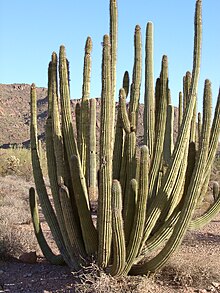| Organ pipe cactus | |
|---|---|

| |
| S. thurberi thurberi | |
| Scientific classification | |
| Kingdom: | Plantae |
| Clade: | Tracheophytes |
| Clade: | Angiosperms |
| Clade: | Eudicots |
| Order: | Caryophyllales |
| Family: | Cactaceae |
| Subfamily: | Cactoideae |
| Genus: | Stenocereus |
| Species: | S. thurberi
|
| Binomial name | |
| Stenocereus thurberi | |
| Synonyms[2] | |
|
List
| |
Stenocereus thurberi, the organ pipe cactus,[3] is a species of cactus native to Mexico and the United States. The species is found in rocky desert. Two subspecies are recognized based on their distribution and height. The Organ Pipe Cactus National Monument is named for the species. Cacti are minimally adapted to particular thermal niches, and are tremendously vulnerable to seasonal precipitation.[4]
Its English common name is derived from its resemblance to a pipe organ. It is locally known as pitaya dulce, Spanish for "sweet pitaya" or sweet cactus fruit.
- ^ Burquez Montijo, A.; Felger, R.S. (2017) [amended version of 2013 assessment]. "Stenocereus thurberi". IUCN Red List of Threatened Species. 2017: e.T151842A121569995. doi:10.2305/IUCN.UK.2017-3.RLTS.T151842A121569995.en. Retrieved 24 February 2023.
- ^ "Stenocereus thurberi (Engelm.) Buxb". Plants of the World Online. Board of Trustees of the Royal Botanic Gardens, Kew. 2017. Retrieved 27 November 2020.
- ^ NRCS. "Stenocereus thurberi". PLANTS Database. United States Department of Agriculture (USDA). Retrieved 2 December 2015.
- ^ Gibson, Arthur C.; Nobel, Park S. (1990). The cactus primer (1. paperback ed.). Cambridge, Mass: Harvard University Press. ISBN 978-0-674-08991-4.
